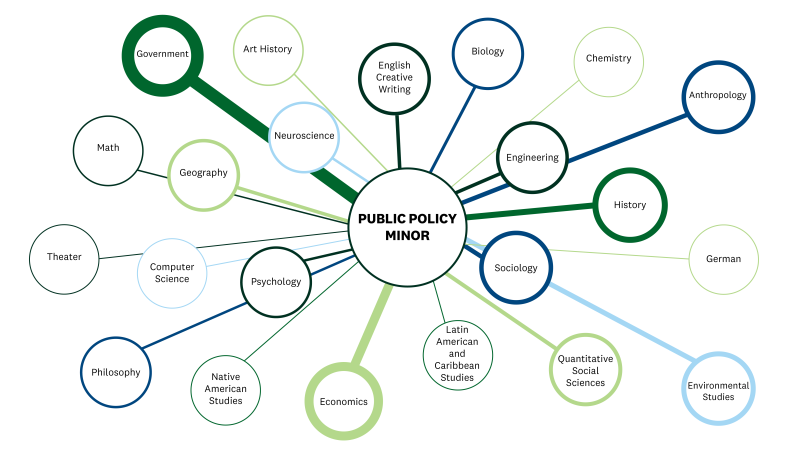
- Public Policy
- Leadership
- Funding
- News & Events
- About the Center
Back to Top Nav
Back to Top Nav
Back to Top Nav
Back to Top Nav

Since 2015, The Nelson A. Rockefeller Center has graduated well over 100 Public Policy Minors from across a wide variety of academic disciplines. In this six-year period, students from 22 different majors completed the public policy minor. While Government, Economics, and History majors are represented in each of the six classes since 2015, the public policy minor has attracted students from: Chemistry, Computer Science, German, Latin American and Caribbean Studies, Native American Studies, Theater, Art History, Math, Philosophy, Neuroscience, Psychology, Biology, Engineering, English Creative Writing, Geography, Quantitative Social Sciences, Anthropology, Sociology, Environmental Studies, History, Economics, and Government. In each of the six years since 2015, an average of eight different majors were represented in each graduating cohort. Students included in this analysis completed the six-course sequence that constitutes our Public Policy Minor.
Our individual classes attract an even more academically diverse set of students. From 2017 to 2019, the three sections of PBPL 45: Introduction to Public Policy Research, taught each fall term to roughly 30 students, attracted students from 24 majors[1]. During the same three-year time period, our Introduction to Public Policy (PBPL 5) class, a large lecture-based class that includes more than 100 students each winter term, attracted students from 34 majors[2].
[1] Government, Economics, Quantitative Social Sciences, Environmental Studies, History, Psychology, Anthropology, Philosophy, English, Classical Studies, Math, Computer Science, Native American Studies, African and African American Studies, Engineering, Middle Eastern Studies, Studio Art, Asian Societies, Cultures, and Languages, Art History, Cognitive Science, Neuroscience, French, Earth Sciences, Women's, Gender and Sexuality Studies.
[2] Government, Economics, Quantitative Social Sciences, Environmental Studies, History, Psychology, Geography, Anthropology, Philosophy, English, Classical Studies, Math, Computer Science, Sociology, Native American Studies, Film, African and African American Studies, Engineering, Middle Eastern Studies, Studio Art, Religion, Asian Societies, Cultures, and Languages, Linguistics, Art History, Comparative Literature, Cognitive Science, Neuroscience, French, Italian, German, Biology, Earth Sciences, Women's, Gender and Sexuality Studies and a special interdisciplinary major in Health Policy.